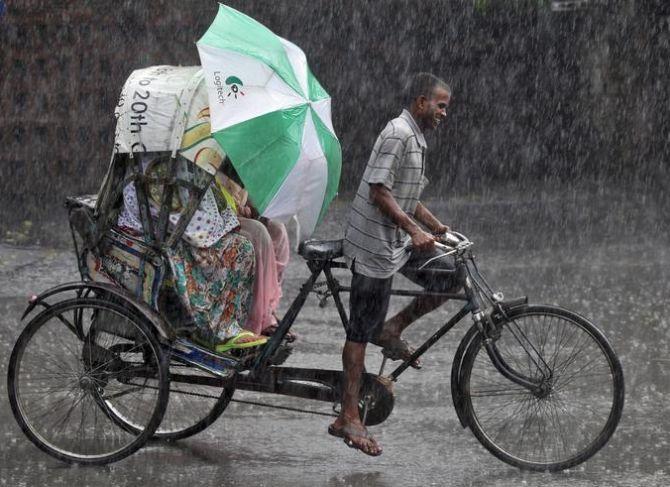After a slow start, the southwest monsoon that reached Mumbai over the weekend is expected to gather steam next week, leading to a quick decline of the seasonal deficit and spurring planting of kharif crops, the weatherman said.

“Every monsoon is different from the previous, and the next week onwards, that is, around June 14-15, we should see a significant uptick in rains with the monsoon expected to cover most of East India and the beginning of good pre-monsoon activity over Vidarbha, Madhya Pradesh, Gujarat.
"This should lead to gradual easing of the heat wave over North India in next 48 hours,” R K Jenamani, senior scientist at the India Meteorological Department (IMD) told Business Standard.
He said with the pick-up in the rains, the seasonal cumulative deficit will also go down in the next few weeks.
The deficit as on June 11, stood at 43 per cent less than normal as monsoon in all parts of the country was below average.
A pick-up in rains and the smooth advance over central and northern parts of the country should spur kharif sowing, which was lagging behind for several crops till the first week of this month, as farmers awaited the first showers.
Overall, the expectation is that if the rains turn out to be good, it could lead to a more-than-average increase in acreage of several crops, as prices have been remunerative in the last season.
“Next week onwards, North India--particularly the states of Punjab, Haryana and Delhi--will start getting good pre-monsoon showers and if the momentum is maintained, then the entire shortage can be wiped off by end of June and the month might turn out to be a normal monsoon month,” Mahesh Palawat, vice president meteorology and climate change at Skymet Weather said.
While releasing its second stage forecast for 2022 monsoon season on May 22, the IMD had said rainfall across the country is expected to be ‘normal’ in June, at 92-108 per cent of the LPA.
In June, India gets about 16.54 cm of the estimated 87 cm of rainfall (around 19 per cent).
Palawat meanwhile said that overall it now seems that the rains might be good over the next four months.
This is because, according to the latest weather models, La Nina which was expected to weaken in the coming weeks might remain cool for the rest of season at least till August which should aid Indian monsoon.
Ahead of the kharif planting season, the government last week, announced the kharif MSPs for 2022-23 crop season that will start from July, raising them by around 4-9 per cent with the maximum hikes reserved for pulses and oilseeds notably moong, soybean and sunflower seed as has been practice since the last several years.
“Though in the case of tur and urad the MSP has been increased by 4.76 per cent that is by Rs 300 per quintal to Rs 6600 per quintal but still pulses area will shift towards oilseeds specially soybean in MP, Maharashtra and Rajasthan, while in Gujarat there will be competition among groundnut, soybean and cotton for acreage this kharif,” Rahul Chauhan, commodity analyst at iGrain India told Business Standard.
Chauhan said in Karnataka, pulses acreage will shift towards maize, soybean and marginally towards cotton, while in AP and Telangana area under groundnut might rise.
“Overall in pulses area will be less than last year because historically it has been seen that Indian farmers worry about price only during selling and sowing of crops,” Chauhan said.












 © 2025
© 2025